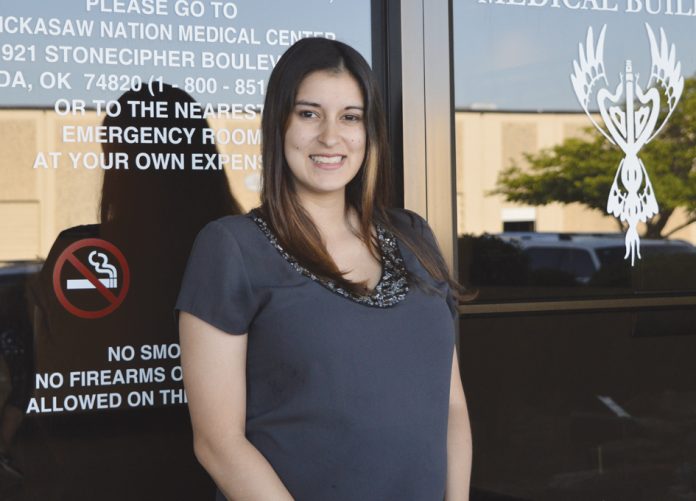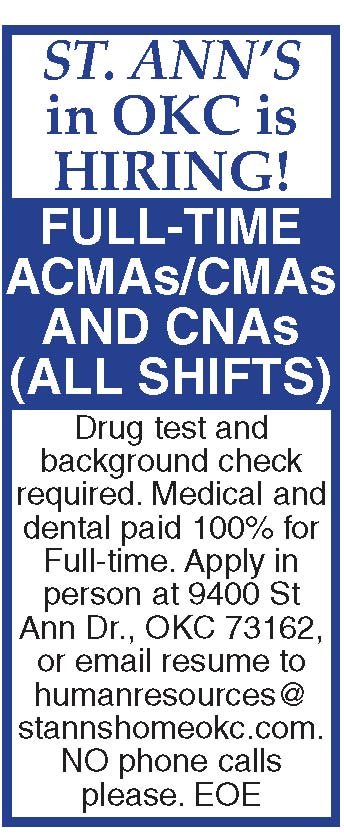
CAREERS IN NURSING
BRINGING FAMILY APPROACH TO PATIENTS’ JOURNEY: OKC INDIAN CLINIC
by Traci Chapman – Writer/Photographer
It’s called the forgotten virus, something that many people know nothing about, although they might have been infected, perhaps even for years. Treating it takes patience, understanding and a willingness to go on a difficult journey with a patient who might not be ready to take it – something Staci Deland, Oklahoma City Indian Clinic’s Hepatitis C coordinator, knows first-hand.
“We just started last year, started doing screenings and it is so difficult for people because they have no idea they have Hepatitis C, let alone what that can mean for their health going forward,” Deland said.
Hep C is a blood-borne disease that has few symptoms and which can stay in patients’ bloodstreams for years without their knowledge. Over time, the condition slowly damages the liver, causing damage or cancer in the organ and even death. According to the Centers for Disease Control, about 3.5 million across the country have Hep C without knowing it, and people born between 1945 and 1965 are five times more likely than any other age group to develop the condition during their lifetime.
While the lack of symptoms poses a great health risk, so too does the fact that Hepatitis C screening isn’t included in routine bloodwork, Deland said.
“That is something that we really want to let people know about,” Deland said. “It’s a simple test and it can be cured, which is the good news – medications cure it in about 12 weeks.
“The bad news is not doing something can lead to very, very serious consequences,” she said.
Conveying that message is one of the most important aspects of Deland’s job. While the clinic’s Hepatitis C clinic has been much of her focus, her primary job is as a nurse care manager, triaging patients and trying to increase public awareness on both treatment and prevention.
“We do things like health fairs and other things like that for the community – we want to be very proactive, and that’s a reason for our work with Hepatitis C,” Deland said.
It’s a concept ingrained throughout Oklahoma City Indian Clinic’s structure and philosophy, Deland said. Patients become part of OKCIC’s family – and, in turn, their families become part of the healing and treatment process.
“For example, the pharmacy works with patients to continue with the Hepatitis C program,” Deland said. “They’re given counseling, they receive education – the patient, their family, the staff, we all work together to make sure they not only get better, but that they have an investment in good health going forward.
“That’s what I really love most about working here – it’s so important for each person to be a part of something bigger,” she said. “There are no numbers, they’re people who rely on us for years, who bring our families and then they come to us with their children and their families.”
That family tradition began in 1969, when a group of physicians volunteered five hours a week to treat central Oklahoma’s American Indian population, at a time when the closest native clinic was more than 40 miles away. When Oklahoma City American Indian physicians, clergy and leaders petitioned the U.S. Congress to honor health care provisions of treaties negotiated long ago, it paved the way to the 1974 incorporation of Central Oklahoma American Indian Health Council and, consequently, OKCIC.
OKCIC has come a long way from the 7,500-square-foot location it first began in, encompassing first a 27,000-square-foot medical facility, then purchasing the adjacent building, which more than doubled the clinic’s space. In 2014, OKCIC celebrated its most recent expansion when it opened the Everett R. Rhoades, MD, Medical Building – which houses public health, optometry, physical therapy, behavioral health services, a wellness center, health promotion and disease prevention, diabetes education classrooms and an expanded pediatric clinic. OKCIC now has about 165 staff members who annually treat almost 20,000 patients from more than 220 tribes, administrators said.
“We’re in this together,” Deland said. “It’s a philosophy that I’ve always thought was important, something I’ve always seen from the people I admired in this field.”
Those people were the closest of examples, Deland said – her grandmother and aunts were all nurses. After graduating from Ponca City High School, she knew exactly what she wanted to do, heading to nursing school, where she earned first her LPN, then her RN. Next, Deland plans to finish her master’s degree. “I want to be a nurse practitioner,” she said.
Deland had her own journey to take before she found what she called the place she is meant to be. After working in pediatric care at St. Anthony Hospital in Oklahoma City for two years, she realized that with her native heritage, she wanted to make a difference for others who shared it.
“There’s a culture here you don’t see at many facilities – it’s a family, they empower their staff,” Deland said. “It took a while to get here but I got here, and it’s the best decision I’ve ever made.”

in OKC is
HIRING!
FULL-TIME
ACMAs/CMAs
AND CNAs
(ALL SHIFTS)
Drug test and
background check
required. Medical and
dental paid 100% for
Full-time. Apply in
person at 9400 St
Ann Dr., OKC 73162,
or email resume to
humanresources@stannshomeokc.com.
NO phone calls
please. EOE












